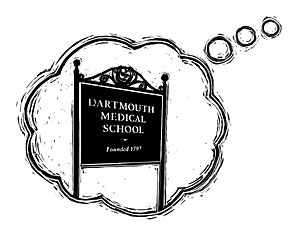For The Record
A view of the whole ground
By Ethan Dmitrovsky, M.D.
I recently read an extraordinary memoir by Jean Kemeny, about her experiences as Dartmouth's first lady, titled It's Different at Dartmouth. She captured the essence of our institution and eloquently conveyed why Dartmouth is a special academic community. At Dartmouth, students, staff, faculty, and alumni all matter. That is why ties with Dartmouth are rarely broken. This bond fosters an uncommonly collegial and collaborative environment that, together with the advantages of our size, minimizes academic barriers. This in turn promotes an interdisciplinary approach on which future advances in science and medicine will depend.

|
|
We are guided by values and goals that are worth emulating
and difficult to find elsewhere. It is different at DMS. |
Sense of service: At Dartmouth's medical school, we emphasize excellence in clinical care, scholarship, teaching, and, importantly, service to our region and nation. This sense of service distinguishes DMS from our peer institutions. Our purpose is to advance the public good. This is why our reach extends far beyond the campus. We must keep the importance of service fresh in our minds.
When Dartmouth President James Wright asked me to become acting dean of our Medical School, I did so out of a sense of service. I chose not to be a candidate for the permanent deanship, however, since my commitment to remain a physician-scientist has never been stronger. I want to continue to participate in the life science revolution. This is the focus of my career.
Such a career path depends on serendipity. Yet serendipity must be recognized when it occurs. This is not always easy. I was fortunate that serendipity struck my laboratory when we were studying retinoic acid and reported that this drug triggered clinical remission in a rare but lethal form of leukemia—acute promyelocytic leukemia. These remissions were due to successful differentiation therapy, where leukemic cells matured before they died. Because of our basic scientific interest in this field, we were able to develop a diagnostic test for this leukemia. That made it possible to tailor therapy to the molecular rearrangement that causes it. Retinoic acid-targeted therapy has recently been combined with conventional chemotherapy, and now the majority of patients with acute promyelocytic leukemia are cured. This is an example of bench-to-bedside, or translational, research. At DMS, we embrace translational research.
Core values: I view scientific discoveries like this as largely about serving the public good. At DMS, we care about the social context of our scholarship, while also competing successfully in the basic and the clinical sciences. To remain competitive, we must continue—even as our academic medical center evolves—to capitalize on the strengths evident in our core values. To confirm the validity of this approach, we need only consider the distinguished faculty recently recruited to DMS from respected peer institutions. To cite just a few examples, this past year we welcomed from Harvard Dr. Gregory Holmes as chief of neurology and Dr. Alan Green as chair of psychiatry. We will soon welcome from UCIrvine Dr. Murray Korc as chair of medicine. It was in large part our values that attracted these and other colleagues to DMS. There are many benefits accruing from their arrival, including a substantial increase in funded research.
This past year, I was offered an unusual view of Dartmouth—that of an administrator. This viewpoint is not an easy one to describe. Yet a biography of Thomas Jefferson—American Sphinx, by Joseph J. Ellis —offers a telling insight. Jefferson was a painfully shy man who rarely spoke in public. It is the subject of legend that he did not even speak out against objections raised to his text for the Declaration of Independence. On a rare occasion when Jefferson did choose to speak in public, his topic was administrative work: He discussed "the view of the whole ground" that comes with leadership.
Skillful guides: I will borrow his perspective as a mirror to reflect on my year in the deanship. What I saw raised my regard for our institution. This academic community is led by individuals who favor Dartmouth's interests over their own. I learned this about the leadership of our academic medical center, about those who helped me serve DMS, and about those who lead the College. This view may contrast with the common image of administrators. Yet I have no doubt but that these leaders will skillfully guide us through the current uncertainty about health-care delivery and the future of academic medicine. This is one of the reasons why I am optimistic about the future of DMS, Dartmouth-Hitchcock Medical Center, and the broader Dartmouth community.
I benefited this year from the strong support and encouragement of this community. I am committed to ensuring a smooth transition to our next dean, Dr. Stephen Spielberg. I ask that he receive the same backing. I am grateful to President Wright, the Trustees of Dartmouth College, the Overseers of DMS, the Trustees and leaders of our academic medical center, the student and alumni bodies, and my colleagues for this opportunity to serve. I recognize and thank DMS's assistant, associate, and senior associate deans as well as the staff in the dean's office, all of whom serve with much distinction.
My view of the whole ground has taught me that Dartmouth is not about its buildings or its beautiful location, but about those who occupy this place. We are guided by values and goals that are worth emulating and that are difficult to find elsewhere. It is different at DMS, and we have important work to accomplish together.
"For the Record" offers timely commentary from the dean of Dartmouth Medical School. Dmitrovsky has been DMS's acting dean during the 2002-03 academic year and is also the Andrew G. Wallace Professor and the chair of pharmacology and toxicology.
If you would like to offer any feedback about this article, we would welcome getting your comments at DartMed@Dartmouth.edu.
